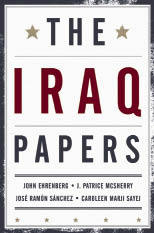‘I was not an enthusiast about getting US forces and going into Iraq,’ Dick Cheney said in 1997, looking back on the First Gulf War.
‘I was not an enthusiast about getting US forces and going into Iraq,’ Dick Cheney said in 1997, looking back on the First Gulf War. ‘I felt there was a real danger that you would get bogged down in a long drawn-out conflict, that this was a dangerous, difficult part of the world.’
How, half a decade later, was that prescience brushed aside by governments on both sides of the Atlantic in the rush for regime change? The Chilcot Inquiry, whose committee of the great and the good has teased out much about the musings of politicians and mandarins in once smoke-filled rooms, may or may not find the answer. This fascinating compendium of documents from the war, edited by a team of specialists in Middle East affairs and US politics, will meanwhile help the rest of us to decide for ourselves.
Beginning with the early circumspection of Cheney and others, they show how the genesis of the conflict lay as much in the realm of ideas as in calculations made behind closed doors. The manifestos of policy wonks in its opening pages echo in presidential soundbites by its end. Along the way there are White House memoranda, memoirs of the extraordinarily rendered, and diktats from both American and al-Qa’eda commanders. Together, they read like a parable of how political rhetoric conspires to make facts — and wars.
The Iraq Papers finds the ideological origins of the invasion in the end of history. Writings of Robert Kagan, Paul Wolfowitz and William Kristol from the 1990s illuminate how neo-conservatism was born of America’s quest to find a new world role after the Cold War. Founded on the shibboleth of unshake- able American might, their big idea was to advocate a more conscious pursuit of the national self-interest. That might include proselytising the blessings of democracy and free markets across the globe, but it eschewed the humanitarian adventures of the Clinton years. In Britain, the legality of the war has become a touchstone for judging its morality; but in the founding scripts of the neo-con worldview, we are reminded, international law was dismissed as a dangerous indulgence.
Even in the heady days of the late 1990s, some wondered if history might return. An interesting article from the turn of the new millennium penned by Condoleeza Rice, then foreign policy adviser to George W. Bush, shows her still imbued in the precepts of the Cold War, a Cassandra alert for the next Soviet-style foe. Yet this was, for the most part, a time of immense American self-confidence in foreign affairs. If Saddam was a long-running sore, and his containment looked increasingly unsustainable (‘bombing Iraq isn’t enough’, Kristol and Kagan were already bellowing by 1998), the Middle East at large still offered a vista of hope for the spread of pro-western, even democratic, regimes.
As the editors point out, the neo-con ideology impressed the foreign policy, but not the Iraq policy, of George W. Bush from the start. Only following 9/11 — and even then after quite some pause — did it encourage a concerted focus on Iraq. The presidential speeches, included in the volume, from the aftermath of the terror attacks sound a new note of vulnerability, as a doctrine of hope increasingly became one of fear. The instrument of this transformation was the elision of terrorism (which had not before been a major neo-con concern) with Weapons of Mass Destruction (which always had). America was, on conventional measures, mightier than ever, but technology was creating new Davids to sling its Goliath. It was through this conceit that Iraq entered centre-stage in the rhetoric of the Bush administration, as the front line of the war on terror: ‘The United States of America will not permit’, the President famously told Congress in January 2002, ‘the world’s most dangerous regimes to threaten us with the world’s most destructive weapons’. The rest, as they say, is history.
Rarely can a collection of documents be called unputdownable, but in tracing the story through the invasion, insurgency and faltering drive to build a functioning state, The Iraq Papers is just that. Still, the editors do not disguise their abhorrence of the Bush administration and readers should not expect an even hand. A chapter is pointedly devoted to the sanctioning of torture and other state-sponsored illegality. With dark humour, they include an account of the Secretary of State, in June 2004, passing a note to President Bush to inform him that sovereignty had been handed over to the interim Iraqi government. Even as the insurgency’s orgy of violence swelled and the horrors in Abu Ghraib prison were coming to light, Bush scribbled on the back of the note: ‘Let Freedom Reign!’
They might also have pointed out that, as the descent into invasion is dissected by posterity, the worst of the anarchy seems now to have passed. In Baghdad nowadays the appalling traffic is more of a talking point than truck bombs. The neo-cons’ dreams of the last millennium are, just possibly, closer to realisation.
James Mather is the author of Pashas: Traders and Travellers in the Islamic World.






Comments